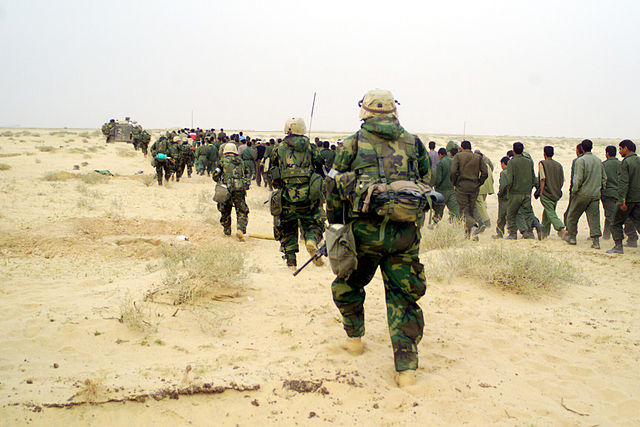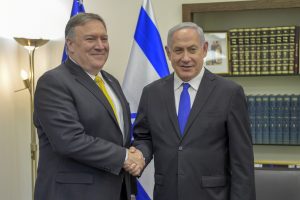by Mitchell Plitnick
Last weekend a pair of horrifying massacres in the U.S. cities of El Paso, Texas and Dayton, Ohio sent shock waves through the country. The outrage was so powerful that even President Donald Trump had to overcome his own indifference to the act and say something that, from another source, might have sounded vaguely presidential. From him it only sounded insincere, especially since he could not even remember which Ohio city had just been so badly traumatized.
Among the punditry, Dr. Eddie Glaude, Jr., Professor of African-American Studies at Princeton, had perhaps the most insightful commentary. As Glaude completed his brief speech on MSNBC, he noted that when we see these horrific mass shootings, we ask, “Oh my God, is this who we are?”
Glaude answered his own question. “What we know is that this country has been playing politics for a long time on this hatred—we know this. So, it’s easy for us to place it all on Donald Trump’s shoulders. It’s easy to place Pittsburgh on his shoulders. It’s easy for me to place Charlottesville on his shoulders. It’s easy to place El Paso on his shoulders.” But then Glaude resoundingly proclaimed, “This is us! And if we’re gonna get past this we can’t blame it on [Trump]. He’s a manifestation of the ugliness that’s in us.”
Glaude hit the nail on the head.
No one should minimize the horror of the Trump presidency. We should not belittle the fact that with his every word and action, Trump is trying to create a nation where white makes right, where the poor increase in number and are increasingly unable to survive. He is trying to create a country that hates itself, directing that hate at the other, while he and his cronies laugh all the way to the bank.
Glaude is correct to point out that Trump is not inventing this, he is unleashing it, harvesting hate that has festered for decades, suppressed—but not defeated—by liberal ideals.
But as Americans so often do, we think of the Trump presidency in terms of ourselves, of what happens within our borders. For many of us, that doesn’t even extend to a place like Puerto Rico, which Trump was able to smugly neglect in a way he never would have dared to do to a mainland U.S. city. But what of our foreign policy under Trump and for years before him?
Progressive Americans are asking themselves every day how we can tolerate the separation of families at our borders, the incitement to violence from the White House, the undermining of democracy by the Republican party, who either block legislation en masse or go meekly along with whatever the president and Senate majority leader say. How do we continue to tolerate police shootings of unarmed black men? How do we tolerate an enormous tax cut for the rich while the same people are trying to find ways to kick millions off of health insurance that they can already barely afford?
The list goes on and on. But we do far less introspection when it comes to foreign policy. Events in Gaza, Iran, the United Kingdom, Congo, Kashmir, Syria, Iraq, Egypt, and other places do not exist in isolation from the United States. Sometimes by action, sometimes by inaction, the U.S. affects events all over the world. That’s hardly news. Most Americans know it. But too few of us take it seriously enough to let it influence our votes or political activity.
But when we look at North Korea, we see decades of ineffective United States policy that led to Trump’s approach that pushed Kim Jong-un to dash to a nuclear weapon and then to Trump’s warm embrace of the young dictator, removing much of the leverage against him and undermining the efforts of South Korean president Moon Jae-In to find a way to break through the long stalemate between the divided sides of the Korean Peninsula. Is this us?
In Libya, we took the invitation of the African Union and United Nations to protect Benghazi from a potential massacre and extended our mission to topple Muammar Gaddafi, despite not having any idea what we would do when his government fell. The country has been in chaos ever since, and we’ve almost entirely ignored it. Is this us?
In recent weeks, we have seen the brutal slaughter of civilian protesters in Sudan, and an increasingly violent crackdown on pro-democracy protesters in Hong Kong. The situation in Sudan seems to have calmed for the time being, while the Chinese are making much bolder threats in Hong Kong. The United States, despite its trade war with China, and its abiding interest in seeing stability come to Sudan, has remained conspicuously silent about all of this. Is this us?
As Bashar al-Assad brutally murdered hundreds of thousands of Syrians, the United States vacillated between arming extremist groups who were just as bad as Assad and working to find ways to extricate itself from the situation altogether. At no time did we ever try to support the Syrian people, particularly in the early days when the opposition still represented the popular will of the Syrian people demanding democracy. Nor have we striven to find a way to limit Russia’s involvement in the ongoing civil war. But we did try to slam our doors to the refugees that came pouring out. Is this us?
In Egypt, we grudgingly accepted the election of Mohammed Morsi, whose party was representing the Muslim Brotherhood, but when the opportunity came to oust him by a military coup, Barack Obama and his administration jumped at the chance. The heady days of the popular revolution that dethroned Hosni Mubarak came to a quick and brutal end under the iron fist of Abdel Fattah el-Sisi. We watched as Sisi attacked what little democracy remained in Egypt and racked up an “impressive” record of human rights violations. Trump came in and embraced Sisi like a brother. Is this us?
The genuine enmity between Iran and the U.S. goes back to 1979, but Donald Trump took an unprecedented step in scrapping a deal that Iran was honoring even according to his own cabinet members. He has instituted sanctions that are not harming the Iranian regime, but are doing great harm to the Iranian people, while strengthening Iranian hardliners and sending tensions in the Persian Gulf through the roof. Is this us?
Yemen is one place we have noticed, but would we have done so if not for the brutal murder of Jamal Khashoggi, ordered by Saudi Crown Prince Mohammad bin Salman (MBS)? Almost certainly not. And we tolerate the ongoing BFF relationship between the Trump family and the Saudi ruling clan they seem to envy so much for their autocratic and shameless wealth and power. Is this us?
In Venezuela, we thwarted diplomatic efforts in favor of backing an attempted coup by a heretofore unknown politician who had no following beyond that which U.S. allies in the Lima Group could create. That came after years of trying to undermine the leftist regime there, in the hope that Venezuela would return to the right-wing dictatorship that preceded it, which was more brutal. We continue to apply throttling pressure on Venezuela’s economy, which bolsters support for Nicolas Maduro’s failed regime and only increases the suffering of the Venezuelan people. Is this us?
After a quarter century of bending over backwards to reassure Israel, or to accommodate the day to day vagaries of Israeli politics, we had to acknowledge that the Oslo process was a dismal failure, yet we still fail to grasp why. We still don’t see that Israel, being vastly more secure, stable, and powerful, does not have an incentive to take risks for peace, especially with leadership that doesn’t really want an agreement in the first place. We enabled that, through successive presidents, while the settlements expanded, and the occupation tightened. But then Trump came along and “took issues off the table.” He decided to recognize Jerusalem as Israel’s capital, and to recognize Israel’s sovereignty over the Golan Heights. He decided there was not 5 or 6 million Palestinian refugees, but a mere handful, those who were still alive 71 years after the nakba when Israel came into being. He cut off aid to Palestinian hospitals and schools and to Palestine almost entirely, then demanded the Palestinians come talk to him and his ambassador, whose settlement enterprise was watching gleefully as Israel demolished more Palestinian homes in East Jerusalem. All this without asking Israel to do anything in return. Is this also us?
We can look farther back at Grenada, the Cuban embargo—which Trump has now fully reinstated—and, more obviously, the wars in Iraq, Vietnam, Cambodia, Laos, and Afghanistan, actions in Chile, Honduras, Guatemala, El Salvador, and on and on.
And yes, this is us. It’s gotten so much worse under Trump, through a combination of indifference, a militaristic and xenophobic worldview tinged with isolationism and cold-hearted nationalism, and sheer, unprecedented incompetence. But it’s always been us.
It must end. The United States can neither be an imperial power nor can we ignore the fact that we are likely to remain the most powerful country in the world on some level for quite some time to come. But this can’t happen until the people of the United States recognize that we cannot live in isolation from the rest of the world. And the world cannot afford to see us withdraw completely, even if it needs us to recognize that we are citizens of that world, no more or less valuable than any others.
If we are to move to a foreign policy where the United States is, at last, a real force for good that discourages war and want everywhere rather than promoting them, we must first understand what we are doing.
We must acknowledge who we are and who we have been. We need to ask ourselves, is this who we want to be? And if we say no, we must decide who we should be. That will give us something to strive for. And it could well help to bring us, after the inevitable arguing over those answers, to a more unified and, dare I say, a more perfect union, one that can have a much more positive impact on the world.






Excuse me, it wasn’t any action by Trump that led to Kim Jong Un developing a nuclear weapon, it was John R. Bolton, Dick Cheney, and George W. Bush.
What a brave piece of writing. Unmistakably and brutally honest. I can not believe the earlier comments, are you guys serious implying that the writer Mr. Plitnick is part of the system. He is anything but! You do not see brave, insightful, and well written journalism like this anywhere. As for N .Korea the commentator must be kidding. Do you mean to say that Trump didn’t play kissy face with KJU and brag about an agreement. Talk about killing the messenger. Thank you Mr. Plitnick for as fine , and seering a piece of writing as I have seen in a long time.
One must ask the question: why are majority of Americans so indifferent to the mayhem generated by their government. It is definetely true that many of them are moral individuals and are troubled by the policies of their government, but at the same time they know are have a hint that they are beneficiaries of these policies. Yes, arm sales generate jobs, economic hegemony, dollar’s predominance as the dominant currency in the World benefits them. At any time, tens of millions of Americans are travelling, working (making money) abroad. Just speaking English is an asset. An American passport is a precious commodity. So, many Americans are perhaps uncomfortable with foreign policy of USA, but tolerate it or simply justify it. I don’t buy the “ignorance” argument; some of it is willful ignorance. If you know bad things are done under your name and you don’t try to learn what they are, you are not as ethical as you think.
@JimLobe,
Your moderator(s) must have found my comments were very critical of the US foreign policies for the past 70 years and still either reviewing the comments or were dumped in the trash can!! Sometimes we can’t handle the truth!
With regards,
@RIGTHOFRETURN,
You are absolutely correct and it’s not the common excuse of “Americans are ignorant of their government’s foreign policy”. It is rather the expectations of the people from their own government. As long as the Americans have access to cheap resources, fuels to burn, auto to drive, food to eat, clothes to wear and beer to drink they really don’t give a shit how the government and its military protects and procures the needed resources. It’s more like apathy or shrugging of their shoulders.
The US procures much of its needs (may be with the exception of the agricultural products) from outside of its borders and no longer manufactures anything except military armaments, petrochemical products and refining of crude oil.
Of course in the midst of all that the arm manufacturers market a lot of guns and automatic sub-machine guns enabling Americans either to kill themselves or killing many others domestically.